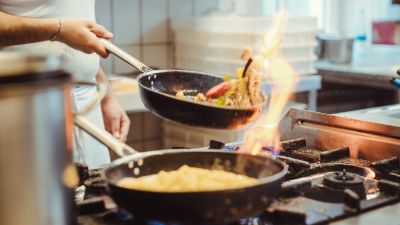Restaurant Inspections – 10 Essential Factors to Consider

When it comes to running a successful restaurant, one key aspect that cannot be overlooked is ensuring compliance with food safety and hygiene standards. Restaurant inspections play a vital role in ensuring that restaurants and food establishments meet the required regulations and provide a safe environment for both staff and customers.

Local authorities are responsible for enforcing food hygiene laws and can inspect your restaurant at any time. In this article, we will explore ten essential factors that restaurant owners and managers should consider to maintain an excellent reputation for food safety and receive top scores during restaurant inspections.
10 factors to consider for restaurant inspections
- Staff Training
Well-trained restaurant staff are the backbone of any successful restaurant and restaurant inspectors will expect staff to have a good understanding of food hygiene practices. Ensure that all employees are educated about proper food handling, personal hygiene and cleaning procedures. Regular training sessions and refreshers should be conducted to keep everyone updated with the latest food safety practices. We offer a range of Level 1 and Level 2 Food Hygiene courses, although we would recommend Level 2 for people employed in a restaurant and handling food. - Sanitation and Cleanliness
Restaurant inspectors will be looking for clean and hygienic environments. It is advisable to regularly clean and sanitise all surfaces, equipment, utensils and food preparation areas, as well as implement a cleaning schedule that covers all aspects of your establishment, including restrooms and dining areas. You can delve into how to keep a commercial kitchen immaculate in our guide on How to Clean a Commercial Kitchen. - Proper Food Storage
Restaurant inspectors will be looking for correct food storage practices, which are essential to prevent contamination and maintain food quality. Train your staff on proper storage techniques, such as storing raw meats separately, maintaining appropriate temperatures for refrigerated and frozen foods and adhering to first-in, first-out (FIFO) principles. Here are Five Everyday Tips to Remember About Safe Food Storage. - Temperature Control
Ensure that all refrigerators, freezers and cooking equipment are calibrated regularly and working at the correct temperatures. Our Food Temperature Guidelines outline the three key areas for keeping food at the right temperature. - Pest Control
A robust pest control programme is imperative to prevent infestations and protect your establishment’s reputation. Conduct regular inspections, seal any entry points and work with professional pest control services to eradicate and prevent pests. - Allergen Management
With the rise in food allergies, restaurant inspectors will be looking to see if a restaurant has a thorough allergen management plan in place. Train your staff on how to handle allergens properly, clearly label menu items and have protocols to prevent cross-contamination. You can refer to our Food Allergy article for more information. - Documentation and Record-Keeping
Maintain organised records of all food safety practices, staff training sessions, cleaning schedules and temperature logs. Having detailed documentation readily available to show restaurant inspectors during inspections will showcase your commitment to food safety. - Regular Self-Inspections and HACCP Plans
Performing self-inspections allows you to identify potential issues before official restaurant inspections occur. Develop a checklist that covers all critical areas of your restaurant operation and conduct regular self-assessments to address any deficiencies promptly. A HACCP (Hazard Analysis and Critical Control Points) plan is a systematic approach used by food businesses to identify, evaluate and control potential food safety hazards. It is a preventive system that focuses on identifying critical control points (CCPs) in the food production process where hazards can be prevented, eliminated or reduced to an acceptable level. For more information about these plans you can visit our article: HACCP Frequently Asked Questions. - Compliance with Regulations
Stay up to date with regulations regarding food safety and restaurant operations. Restaurant inspectors will be looking to see if you regularly review and adhere to these guidelines to ensure your establishment remains compliant at all times. Our Food Hygiene Legislation article outlines the food safety legislation that has been introduced since the 1990s. - Continuous Improvement
Maintaining a safe and compliant establishment is an ongoing process. Embrace a culture of continuous improvement by seeking feedback from customers, staff and restaurant inspectors. Use this feedback to make necessary adjustments, enhance practices and consistently improve food safety standards.

Conclusion
Restaurant inspections are essential for maintaining a safe and hygienic dining environment. By considering these essential food safety factors outlined in this article, a culture of cleanliness and professionalism can be created. This will not only help restaurant owners and managers pass their inspections with flying colours, but they can also build trust with customers and establish a reputation for excellence. A commitment to food safety is an investment in the long-term success and sustainability of your restaurant.

Resources
- The Food Standards Agency (FSA) has produced a Food safety checklist that outlines the items you will be inspected on and helps you prepare for a restaurant inspection.
- The FSA has produced Safer Food, Better Business (SFBB) packs that include information on cross-contamination, cleaning, chilling, cooking, management and using a diary to help you comply with food hygiene regulations and ensure food safety. They have a variety of packs available for different sectors, such as residential care homes, teaching resources for colleges, caterers and many more.
- We have produced some articles that outline how you can Prepare For The EHO Visit and understand what An Environmental Health Officer Can Do.
- Here you can read more about The Food Hygiene Rating Scheme.
Food hygiene training
If you need a Level 1 or Level 2 food hygiene course, you can take them entirely online, in just a couple of hours. When you purchase, you can start training immediately, and afterwards you can download your verifiable food hygiene certificate straight away upon completion. Our friendly customer support team is always happy to talk through your food hygiene training options. Why not give us a call on 01327 552136, email us at hello@smarthorizons.co.uk.
Related Links
- Bad Food Hygiene: What Does it Cost?
- What Can Poor Food Hygiene Cause?
- Food Safety Mistakes: What to Avoid and How
- What are the 5 Food Safety Rules?
- Types of Food Hazards: What You Need to Know
- Hidden Bacteria: 5 Kitchen Areas with Unseen Bacterial Growth
- Why Kitchen Workwear is Vital to Good Food Hygiene
- Cleaning Kitchen Surfaces – 6 Steps for Proper Hygiene
- Importance of Handwashing in Food Service
